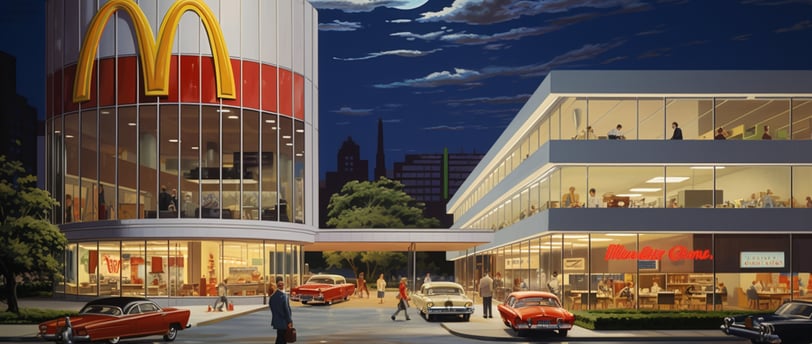How to Pivot: Ray Kroc's Transformation from Burgers to Real Estate
"Discover how Ray Kroc, the mastermind behind McDonald's, pivoted from fast food to real estate to overcome financial struggles. This insightful look into Kroc's innovative strategy reveals lessons on adaptability and vision, illustrating that the ability to change direction can be a pathway to success."
8/9/20232 min read


Introduction
Ray Kroc, known as the man behind McDonald's, transformed a small burger joint into a global fast-food empire. But what many don't realize is that despite being the most successful franchisor of his time, Kroc faced financial challenges that nearly broke him. His genius lay in his ability to pivot from focusing solely on burgers to recognizing the potential in real estate. This blog post explores Kroc's strategic shift and the lessons we can learn from his adaptability and vision.
1. The Golden Arches: A Brief Background
McDonald's Rise: Kroc's franchising model revolutionized the fast-food industry, turning McDonald's into a household name.
The Financial Struggle: Despite massive growth, the narrow profit margins from selling burgers put a strain on Kroc's finances.
2. Recognizing the Real Opportunity: Real Estate
- The Idea: Kroc's financial struggles led him to realize that the real profit lay not in the burger business but in the land beneath the restaurants.
- The Formation of the Franchise Realty Corporation: Kroc formed a company to buy the land and lease it to franchisees, ensuring a more stable revenue stream.
- Impact on Franchisees: This move changed the relationship with franchisees, giving Kroc more control over the business operations.
- A Win-Win Model: The real estate strategy allowed Kroc to provide attractive locations to franchisees while generating consistent income.
3. The Anatomy of a Pivot: Breaking Down Kroc's Strategy
- A. Identifying the Need to Pivot
- Lesson: Recognizing when your current path is unsustainable is crucial to making a timely and effective pivot.
- Kroc's Insight: Despite franchising success, the profit margins from burgers were not enough. Kroc saw an opportunity in owning the land.
- B. Strategic Risk-taking
- Lesson: Pivoting often involves risk, but calculated risks can lead to significant rewards.
- Kroc's Gamble: Investing in real estate was a bold move that required vision and courage but ultimately paid off.
- C. Innovation and Adaptation
- Lesson: Innovating and adapting to new circumstances are essential for survival and growth.
- Kroc's Innovation: He transformed the business model to capitalize on real estate, setting a precedent in the industry.
- D. Building Relationships and Trust
- Lesson: Strong relationships with stakeholders can facilitate a successful pivot.
- Kroc's Approach: He fostered relationships with franchisees and understood their needs, making the transition smoother.
- E. Implementing the Pivot
- Lesson: Effective execution is as vital as the decision to pivot.
- Kroc's Execution: He meticulously planned and executed the real estate strategy, ensuring alignment with the overall business goals.
- F. Understanding Your Leverage
- Lesson: Knowing what you control can provide stability during change.
- Kroc's Leverage: His control over the land gave him leverage over franchisees, ensuring alignment with his vision.
4. The Impact of the Pivot: Long-term Insights
- Financial Stability: The real estate move created a consistent revenue model that benefits McDonald's to this day.
- Enhanced Control: Owning the land allowed Kroc more control over franchise operations, ensuring quality and consistency.
- A Legacy of Strategic Thinking: Kroc's pivot is studied as a classic example of business innovation and strategic adaptation.
Conclusion
Ray Kroc's pivot from the burger business to the real estate business is a masterclass in strategic thinking, adaptability, and innovative problem-solving. His ability to see beyond the immediate challenges and recognize a hidden opportunity transformed not only his fortunes but the very foundations of the fast-food industry.
Whether in business or personal life, Kroc's journey offers a timeless lesson: success often requires the courage to change direction and the vision to see opportunities where others see obstacles. In a world that's constantly evolving, the ability to pivot may just be the most valuable skill of all.
